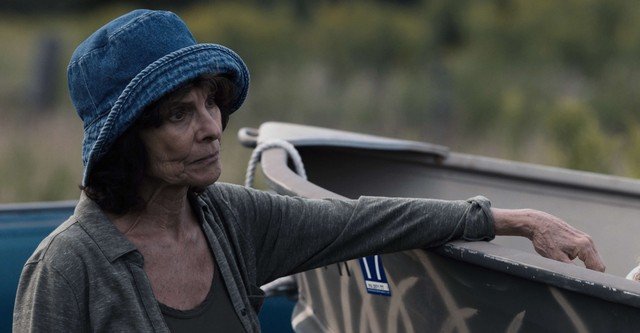Unearth (2021) Dark, Dull, and Depressing Eco Horror
Originally published December 11, 2021
Title: Unearth
First Non-Festival Release: April 20, 2021 (Premiere)
Director: John C. Lyons, Dorota Swies
Writer: Kelsey Goldberg, John C. Lyons
Runtime: 94 Minutes
Starring: Marc Blucas, Adrienne Barbeau, Allison McAtee
Where to Watch: Check out where to find it here
Struggling with the crushing weight of medical debt, student loans, and a failing business, a family decides to make a deal with a gas company to allow fracking on their land. Their hope is after the initial settlement, the royalty checks coming in after the fact will lift them out of financial slavery. The family that owns the farm next to them is angered with their decision but decides to tough it out. They’ll all soon realize that there are worse fates than succumbing to financial woes after something comes out of the drilling.
A bloated family drama meets eco-horror, Unearth fails to strike up a compelling story or tangible scares.
It’s very clear that Unearth is a film with a sole message: anti-fracking. Unfortunately, the message is the movie and there’s nothing more to it. The actual thing that comes out of the ground is irrelevant to the story. What makes the horror scarier is the effects of the drilling on the families. On paper this is great, but it gets betrayed by its ending that doesn’t quite make sense. It’s clear that the writers want to highlight the unique desperation of both families and how they are affected, regardless of whether they signed the deal or not. This is the horror that takes precedence over whatever is responsible for their demise.
The idea of faceless corporate greed plays into this as well. Other than a few workers here and there, most of the interactions with the gas company are one-sided, making that feeling of powerlessness and the unknown more palpable. It hurts even more knowing how much these families rely on their land to make ends meet. The casual callousness of the company to circumvent any effort to pay them through loopholes and shallow justifications is more horrific than any direct violence that occurs onscreen.
Most of the insight we get into these characters is that they must make hard choices and suffer the consequences regardless. We get to see how some interactions may seem malicious come from a place of desperation, like cursing a neighbor or up charging someone for services. They’re good people caught in a bad situation. The most jarring part of the film, it’s time skip, serves to accelerate their situation in a more realistic fashion. That doesn’t take away from how weird it is to watch happen, but it makes sense narratively speaking, especially when discussing eco-horror beget by uncaring corporations.
Much more of a horror drama than I expected, which isn’t a bad thing, Unearth fails more on a filmmaking level than how the story is told. Very dim lighting, especially in the final act, makes it difficult to tell exactly what is going on. This could either be a ploy to hide its effect work, which is scant but pulled off convincingly enough, or to obscure the geography of the final moments of these families. Overall, Unearth is a bland and slow horror offering that is more interested with its message than telling a good story.
In the end, Unearth feels more like a statement than a film, which isn’t a bad thing. It’s great to have a message and share an important story, particularly those that are forgotten about or swept under the rug. Unfortunately, Unearth doesn’t do much with its material nor go beyond its initial statement. It muddles in the conventions of psychological and cosmic horrors that came before it. It doesn’t help that no one aspect of the film is a surefire draw for audience members. There have been many worse films made but the big sin of Unearth is its inability to leave an impression. When watching, don’t expect to strike gold, temper your expectations and maybe you’ll be satisfied with your royalties.
Overall Score? 4/10


